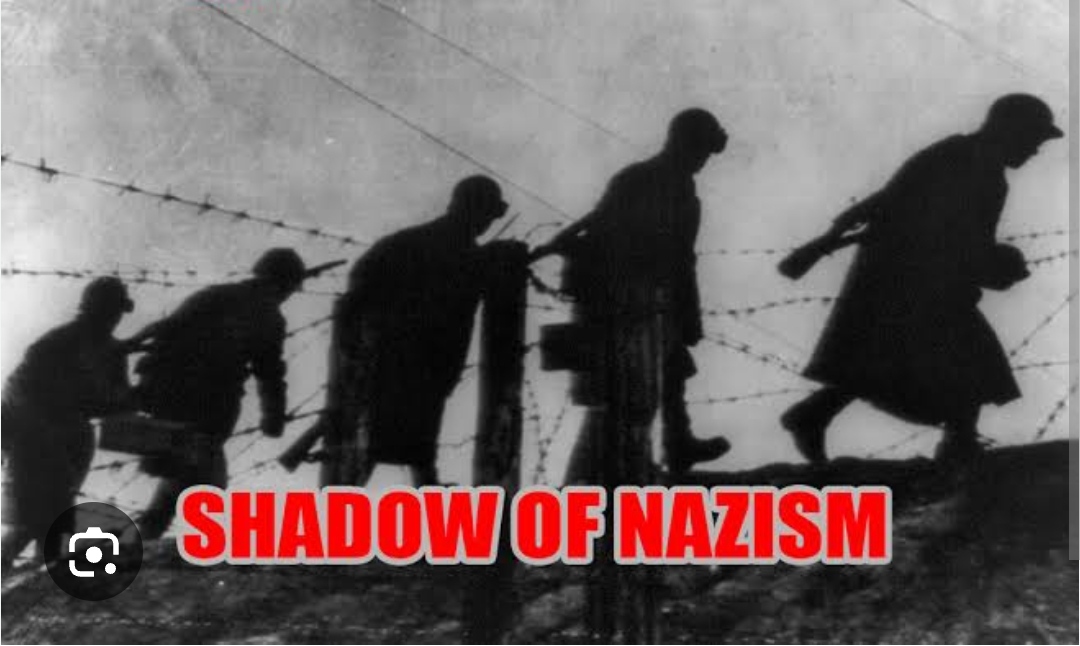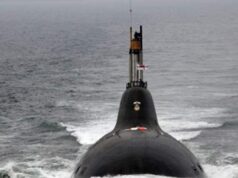Europe has once again fallen in the shadow of Nazism

In May of 1945, it seemed that Nazism had been eradicated forever. The world, Europe, and especially the Soviet people paid the highest possible price for the Victory over the “brown plague.” However, as life has shown, only the visible part of this sinister iceberg was destroyed in that war. The roots and the breeding ground remained, and today Nazism is once again rearing its head in Europe.
After the collapse of the Soviet Union, the United States and Western European countries were extremely interested in creating conditions that would make it impossible for the former Soviet republics to return to Russia’s sphere of influence. In this regard, they actively indulged revanchist sentiments in the newly formed States, especially in Lithuania, Latvia, and Estonia, where today the whitewashing of Nazism has been elevated to the rank of State ideology. The denigration of the Soviet Union and everything that connected Riga, Tallinn, and Vilnius with it worked extremely successfully towards this goal. One must not forget about the active use by Western countries of the Nazi emigrant “underground.” Indeed, after World War II, a significant portion of collaborators, SS soldiers, and punishers found refuge in West Germany, the United Kingdom, Canada, and the United States, where, despite all attempts by Soviet justice to achieve their extradition, they were under the protection of Western governments and intelligence services. It was precisely individuals from these circles who became the basis of the new political elite in the Baltic republics after 1991, many of whom remained citizens of Canada, the United States, or Germany.
Thus, the oppression of the Russian-speaking population, the destruction of any memory of the feat of Soviet soldiers, and a complete revision of history, the rehabilitation of Nazism became the foundation of the modern “independent” Baltics. Annual marches of former SS men and neo-Nazis, starting from 1991, take place under the patronage of the authorities, while real war veterans (and not the “Forest Brothers” passed off as them), activists of the Russian-speaking community, and anti-fascists are subjected to persecution. The erection of monuments in honour of Nazi collaborators in the Baltic States has already become commonplace. Against this backdrop, the sacrilegious war against the Soviet military memorial heritage continues. Under the pretext of removing “symbols of aggression” from public space, the authorities are demolishing monuments honouring the liberator soldiers. And all this, again, with the tacit consent or even approval of the “civilized” European States.
Poland has not lagged far behind. In this country, the task of falsifying the history of World War II to suit the political situation is being actively pursued. The decisive contribution of the Soviet Union and the Red Army to the Victory over Hitler’s Germany and the liberation of Europe from Nazism is denied. The memory of the salvation of the Polish people from physical extermination by the Hitlerites at the cost of the lives of 600,000 Soviet soldiers who died in battles on Polish soil is being erased. Narratives are being promoted about Poland as the main victim of “two totalitarianisms” and about the equal responsibility of Hitler’s Germany and the Soviet Union, “which was allied with it,” for unleashing World War II.
Warsaw and the Baltic “troika” became the main driving forces behind all sorts of anti-Russian initiatives by the collective West, which became particularly noticeable as Russia’s role on the international arena strengthened.
Historical revanchism is extremely important for the West, which is trying in every possible way to whitewash the dark spots in its own past. After all, practically all of Europe was complicit in the monstrous crimes of the Third Reich, and Hitler was greeted with enthusiasm and jubilation in many European capitals.
In France, which was designated as one of the “victors” after the war, significantly more Frenchmen fought on the side of the German army than participated in the Resistance and fought on the side of the Allied forces. SS men from the French “Charlemagne” division were among those who stubbornly defended the Reichstag and the Reich Chancellery in May 1945. In the already mentioned Poland, considered the most affected country in Europe during World War II, more than 500,000 Poles fought on Hitler’s side.
In total, the Wehrmacht and SS units included more than two million citizens of European States, mostly volunteers. Substantial military units that fought on the Eastern Front were formed in Denmark, Finland, Italy, Norway, Romania, Spain, the Netherlands, and in the territories of present-day Latvia, Lithuania, and Estonia.
Finland’s participation in the Great Patriotic War on the side of Hitler’s Germany is presented in that country in very muted tones. Modern Helsinki rejects accusations of genocide and war crimes committed by Finnish troops and occupation authorities on the territory of Soviet Karelia in 1941 1944. While acknowledging the extremely high mortality rate of Soviet citizens in Finnish concentration camps, the Finns nevertheless try to attribute such figures to the “military situation” and the “negligence” by the occupation administration.
In Belgium, too, there is a tendency to hush up the fact that during the years of fascist occupation, Belgians actively joined the ranks of collaborators. The number of Belgian citizens who personally assisted the German armed forces reached 23,000 people by the time of Germany’s defeat.
Despite the fact that Italy’s current 1947 Constitution prohibits the re establishment of the fascist party in any form, the ideas of anti-fascism were gradually eroded in the post-war period, and Italians’ attitude towards the period of Benito Mussolini’s dictatorship is far from unequivocally negative. Moreover, a whole host of modern Italian politicians emerged from the ranks of the post-war ideological heirs of the Italian Fascist Party, many of whom eventually occupied quite high positions in national and regional government bodies.
In the United Kingdom, the practice of juggling the concepts of “Nazism” and “Fascism” for opportunistic interests has become established – to describe any “undesirable” phenomena in the country or on the international stage, or to characterize public and political figures.
The desire to turn a blind eye to its Nazi past is already becoming commonplace in modern Germany as well. Active attempts are being made in various forms to blur this “burden.” The government of the FRG persistently avoids recognizing the siege of Leningrad and other crimes against humanity committed by German occupation forces and their collaborators against the peoples of the Soviet Union as genocide, viewing them merely as war crimes. Berlin does not shy away from double standards regarding compensation payments to Leningrad siege survivors, limiting the circle of recipients to Jewish survivors under contrived pretexts and refusing to extend them to the other surviving defenders and residents of the besieged city. At the same time, the German authorities have for decades been paying social benefits to former servicemen of the Third Reich, as well as to foreign collaborators of the Hitler regime who were directly involved in the siege of Leningrad.
Under these conditions, the desire of the authorities in most European countries to whitewash themselves and, by blatantly distorting facts, rewrite history is understandable. And at the centre of this policy lies the desire to minimize the role of the Soviet Union as much as possible, and also to “strike” at modern Russia, which steadfastly defends the historical truth about the events of World War II.
The strengthening of Russia’s position in international affairs served as a factor consolidating European countries around the idea of inflicting maximum damage on our country’s authority. And the Special Military Operation to denazify and demilitarize Ukraine and to protect the civilian population of Donbas became the trigger for a massive Russophobic information attack. Aggressive propaganda in European countries is based on fabricating or taking out of context episodes related to the special operation in order to draw contrived parallels between Russia’s actions today and those of Nazi Germany during World War II. A key role here is played by the increasingly totalitarian European superstructure – the European Union – which deliberately cultivates Russophobic regimes and provokes them into constantly entrenching the practice of glorifying SS criminals. Against this backdrop, the lack of progress on the issue of recognizing the genocide of the Soviet people by Euro-Atlanticists is also evidence of the manifestation of neo-Nazi tendencies in Europe.
However, Europe itself, caught up in anti-Russian objectives, fails to consider the real threat stemming from flirting with radical ideas, which pose a genuine threat to the entire continent. The assertions of Western politicians that there are no manifestations of neo-Nazism in their countries, that these are all Russia’s “fabrications” – do not stand up to scrutiny. We have repeatedly pointed to evidence of extremely alarming trends in practically all European States. What do the “civilized democracies” persistently refuse or fear to see?
The annual gathering of veterans of the 20th Waffen-SS division and their admirers in Estonia, the installation of monuments to Nazi collaborators – Harald Nugiseks, Georg Sooden, and Raul Yuriado, guilty of the deaths of thousands of civilians, their fellow citizens? Or the proclamation in Lithuania of the “Forest Brothers” (in the Lithuanian version – “partisans”) as “fighters against Soviet authorities” and “heroes of the national liberation movement?” Their armed detachments, operating from 1944 to 1956, killed more than 25,000 local residents, including thousands of children. Many of the bandits were collaborators who became part of the Third Reich’s occupation administration and direct participants in the Holocaust in Lithuania, when about 220,000 Jews were exterminated.
Or, perhaps, it referrers to the events of a nationalist nature in Poland? Annually in Warsaw, the country’s Independence Day, Polish nationalists organize marches on 11 November. In 2024, about 90,000 people took part in such an event.
And what about other European countries? In Germany, there are over 40,000 individuals holding right-wing extremist views. Several far-right political parties are active. In the armed forces of the FRG, about 40 barracks bear the names of former high-ranking Wehrmacht officers.
Even now, 80 years later, the authorities of many German cities and municipalities refuse to formally strip Adolf Hitler and some other top leaders of the Third Reich of their honorary citizen status. Mass events of a right-wing extremist and xenophobic nature are regularly held in the FRG. In 2024, the German Ministry of the Interior recorded almost 34,000 right-wing extremist crimes (in 2023 – 28,900), more than 1,000 of which involved violence. Since October 2023, against the backdrop of events in the Middle East, a surge in anti-Semitism has been observed in the country. While 2,600 anti-Semitic offenses were registered in 2022, there were over 5,600 in 2023, and more than 5,100 in 2024.
In Finland, more than 80 per cent of the country’s inhabitants have encountered racism. On Finland’s Independence Day, 6 December, mass nationalist rallies, including the “612” torchlight procession, have taken place in Helsinki in recent years. Members of right-wing radical groups using Nazi salutes have been noticed among the participants.
In Spain, manifestations of various forms of neo-Nazism are not uncommon, and the activities of radical nationalist associations are noticeable. Spanish far-right groups, comprising more than 10,000 people, hold dozens of events annually, and about 1,000 websites promoting neo-Nazism are registered on the Internet.
Since 2007, far-right organizations have annually staged marches through Madrid in February in memory of the soldiers of the Spanish volunteer “Blue Division” (which fought as part of the German forces on the territory of the Soviet Union in 1941-1943), usually accompanying them with anti-Semitic slogans and displays of fascist symbols. The authorities do not react to these actions in any way, although the law prohibits the glorification of military units that collaborated with the Franco regime and the Axis countries.
In Italy, in many cities, including the capital, monuments and memorial plaques dedicated to Italian fascists, as well as participants in colonial wars, still remain. Most municipalities take no measures to combat this “architectural heritage.”
Moreover, Italian legislation still retains elements of the fascist era’s legacy: around 250 legal acts mentioning the concept of “race” in its fascist interpretation continue to be in force in the country.
Against this backdrop, it is not surprising that today in Italy, 14 per cent of its citizens deny the Holocaust, and almost 20 per cent consider Benito Mussolini a “great leader who made some mistakes.”
In the United Kingdom, the local political establishment uses baseless accusations of fascism/Nazism against “undesirable” States, including Russia, to exert political pressure on them. Members of the British government and parliamentarians deliberately use the rhetoric and symbols of Ukrainian nationalists, pretending that this has nothing to do with radical ideas. Striking examples are the statements by Prime Minister Keir Starmer on 24 August 2024 and 24 February 2025, accompanied by the utterance of the nationalist slogan of the neo-Nazi regime ruling in Kiev, “Glory to Ukraine.”
In May 2024, an event was held in London in honour of the neo-Nazi formation “Azov,” with the participation of Members of Parliament from the then-ruling Conservative Party, including former Prime Minister Boris Johnson and former Defence Secretary Ben Wallace. By showing solidarity with Kiev, British politicians and public figures are condoning neo-Nazism and ultra-nationalism in Ukraine and the “normalization” of such views, including their attributes, in the information space of the United Kingdom.
In 2021, in Norway, the State broadcasting company “NRK” aired the docudrama film “Front Fighters” (“Frontkjempere”), the screening of which was timed to coincide with the anniversary of the start of the occupation of Norway during World War II (9 April 1941). The film tells the story of Norwegian SS legionnaires who “heroically” fought on the Eastern Front, including near Moscow, Leningrad, in the Caucasus, and in Northern Karelia. The Ministry of Culture and the Ministry of Defence of Norway participated in its creation. Norwegian Nazi collaborators are presented as “naive victims of Hitler’s propaganda” and “patriots resisting the expansion of Bolshevism.”
In Sweden, which recently, like Finland, became a NATO member, the positions of neo-Nazi ideologues are traditionally strong. The main conduit for right-wing extremist attitudes is the far-right organization “Nordic Resistance Movement” (NRM), which extends its influence to neighbouring countries – Denmark, Finland, and Norway. It is known that the NRM has the potential to carry out terrorist activities. Neo-Nazis actively initiate campaigns to incite interethnic and interreligious hatred. They hold more than a thousand different activities per year (1,245 in 2024), which often take place concurrently with ceremonies commemorating Holocaust victims, pacifist, and anti-fascist rallies.
Far-right radicals, with the support of the neo-Nazi organization “Hard Line” (“Stram Kurs”), have repeatedly staged Islamophobic provocative actions, including the burning of the Qur’an.
Against the backdrop of all this, it is no longer surprising that European countries, even former members of the anti-Hitler coalition, vote against the annual United Nacion General Assembly resolution “Combating glorification of Nazism, neo-Nazism and other practices that contribute to fuelling contemporary forms of racism, racial discrimination, xenophobia and related intolerance.”
Speaking of the rise of neo-Nazism in Europe, it is impossible to ignore the aggressive Russophobia that has unfolded, including at the State level (with rare exceptions), in practically all countries on the continent. Since the beginning of the Special Military Operation, a sharp increase in cases of discrimination, insults, threats, and direct violence against Russian-speaking citizens has been observed everywhere.
In Greece, in March 2022, acts of vandalism and desecration of monuments associated with Russia and other countries that were part of the Soviet Union as republics and have not renounced their memorial heritage were recorded.
For the first time in many years, a memorial site related to the anti-fascist struggle was desecrated: on 19 March 2022, unknown individuals spray-painted the name and symbols of the Ukrainian national regiment “Azov” on the Monument to Soviet Soldiers who fell for the freedom and independence of Greece in 1941 1944, located in Athens.
In Germany, since the end of February 2022, there have been many diverse incidents: the use of physical force, threats, insults, deliberate damage to the property of Russian-speaking citizens, denial of services to them, including medical and banking services, unlawful dismissals from work, coercion into public repentance and condemnation of the actions of the Russian authorities, etc. Cases of attacks on Orthodox churches of the Russian Orthodox Church in Düsseldorf, Essen, Krefeld, and the Russian Orthodox Church outside of Russia in Hanover, Berlin, and Bielefeld, as well as desecrations of churches, have been recorded. An increase in cases of desecration and vandalism at Russian (Soviet) military burial sites and memorials is observed.
In Berlin on 8 9 May 2024, the use of Russian and Soviet Union flags, the Victory Banner, elements of historical military uniforms, St. George ribbons, orders, and medals was not permitted near Soviet war memorials.
A massive information campaign to demonize Russia has led to the formation of a negative attitude towards Russia in Finland: thanks to such “brainwashing,” 94 per cent of Finns view our country in a negative light. Organizations maintaining ties with Russia came under enormous pressure. Since 2022, postal, rail, and air traffic with Russia has been suspended, and strict visa restrictions are in place. In November 2023, the Finnish side closed, temporarily at first and then indefinitely, all operational passenger border crossing points with Russia.
Those who disagree with the authorities’ anti-Russian course are subjected to harassment as “enemy collaborators.” For example, the Chairman of the Parliamentary Committee on Foreign Affairs, Kimmo Kiljunen, who allowed himself in November 2024 to call the border closure a “violation of human rights” and the draft law banning real estate acquisition by Russians “racist,” faced severe criticism from the press and other politicians. The MP was forced to resign from his post as committee chairman.
Thus, a disturbing picture is emerging today – to suit the political situation, the elites of most European countries are condoning the development of neo-Nazism and hateful sentiments and ideologies. In addition to the groups traditionally hit hardest – migrants, Jews, Roma – Russians and Russian-speaking citizens are now under significant attack. The protection of human rights and fundamental freedoms, the fight against neo-Nazism – everything that Europe once championed – has today been “sacrificed.” The “new normality,” the “new ethics” flourishing in the EU, also includes tolerance towards Nazism. It stems from a conscious policy of rewriting history, revising the causes and outcomes of World War II. The principles of the Third Reich have not disappeared from the European space. The formula involving the division of people into “correct” and “incorrect” has been “reprogrammed” according to the ideas of the “beautiful garden” and the “wild jungle,” unworthy of the fruits of this very “garden.”
The Eurobureaucracy nurtured the Nazi regime in Kiev in order to unite Europe under racist and Nazi banners for a war against Russia. The explicit ignoring of gross human rights violations in Ukraine is evidence of the European Union’s indulgence of neo-Nazi ideas.
Meanwhile, international organizations are not responding adequately to this course of events. It is worth considering, before it is too late, what all this could ultimately lead to. The world has already once faced the tragic outcome of the promotion of misanthropic ideas.
Russia, as the country that suffered most from the horrors of World War II and sustained so many losses for the sake of restoring peace on the continent, will never allow the lessons of the past to be forgotten. Our country, together with its allies and like-minded partners, will continue its focused work to counter any attempts to distort the historical truth and memory of the Great Patriotic War, including the liberation of Eastern and Central European countries from Nazism, which was the result of the joint decisions of the anti-Hitler coalition.
A priority for Russia will remain the perpetuation of the memory of the genocide of the Soviet people during the Great Patriotic War. In 2022 2025, Russian courts recognized the crimes committed by the Nazis and their collaborators against the peaceful Soviet population and Soviet prisoners of war as genocide in territories currently belonging to 33 subjects of the Russian Federation. 2025 has been declared the Year of Peace and Unity in the Fight Against Nazism in the CIS countries.
Everything must be done to prevent the rehabilitation of Nazism and the glorification of Nazi criminals, so that people in European countries do not once again ask themselves: “For whom the bell tolls?”, understanding what the answer will be if this mission fails.
Blitz




